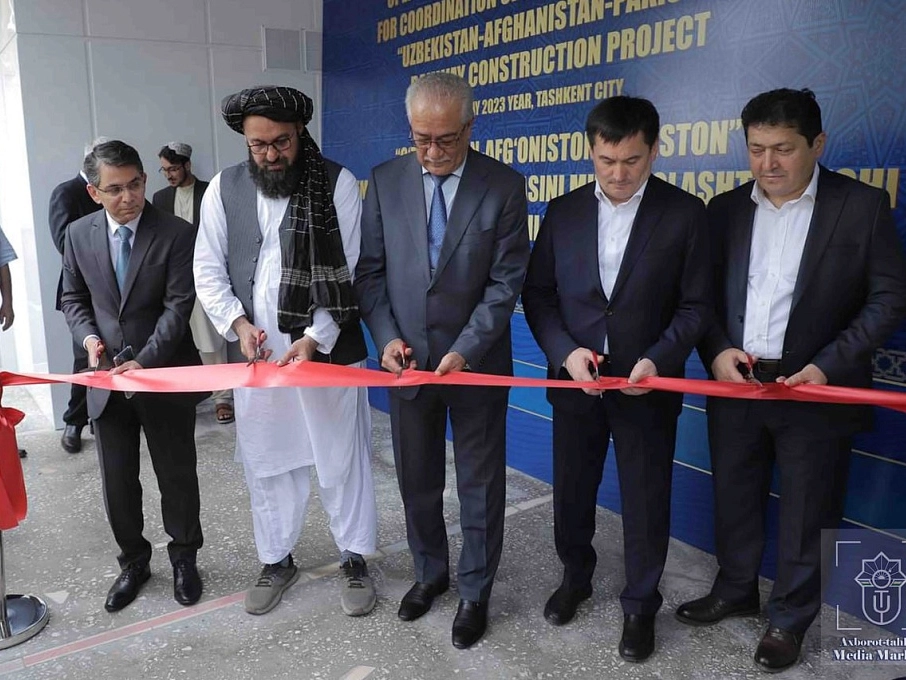It is not clear at present who is going to provide funding for the railroad or how much it will cost.
Plans to build a railroad from Uzbekistan through Afghanistan to Pakistan were given a shot in the arm last week with the opening of a project coordination office in Tashkent.
This apparently concerted return to this multibillion-dollar initiative is again underlining the increasingly pragmatic and accommodating stance governments across Central Asia are adopting toward the Taliban regime in Kabul.
The Uzbek state railway company said in a statement on May 13 that the function of the office would be for all three countries to liaise closely in developing feasibility studies and to accelerate construction of the railroad.
“The opening of a project office in Tashkent will enable specialists to organize more effectively by meeting face to face,” Bakht-ur-Rehman Sharafat, the head of the Afghanistan Railway Authority, said at the ceremony.
Speaking at the same event, Pakistan’s ambassador to Uzbekistan, Ahmed Farooq, said completion of the route would bring Central Asia closer to Pakistan’s 230-million-strong population and open up trade opportunities with countries in the Arabian Sea.
The idea of a railroad running from Uzbekistan deep into Afghanistan has been on the agenda since at least 2017. In December that year, Uzbek President Shavkat Mirziyoyev signed an agreement with his now-deposed Afghan counterpart, Ashraf Ghani, to build a route from the northern Afghan city of Mazar-i-Sharif to Herat in the west. A 75-kilometer stretch of railroad joining Khairaton in south Uzbekistan to Mazar-i-Sharif was put into operation in 2011.
And then, in December 2018, the heads of the state railway companies of Afghanistan, Kazakhstan, Pakistan, Russia and Uzbekistan met in Tashkent to discuss plans to work collectively on building a Mazar-i-Sharif-Kabul-Peshawar railway line. This get-together produced pledges for the establishment of a five-nation working group and a financial consortium.
The idea was to begin work on the railroad in the fall of 2021, but that deadline had to be scrapped following the Taliban’s seizure of power in the summer of that year. The Taliban quickly registered their determination to push ahead with the project, however, and so high-level officials from the three countries involved met in Tashkent in January 2022 to ink an implementation road map.
The stakes are high. Uzbek officials estimate the 760-kilometer railroad could shorten delivery times of goods between Uzbekistan and Pakistan by up to five days. They also believe the cost of carrying cargo will be reduced by 30-40 percent and that, if all goes to plan and the railroad starts operating by the end of 2027, trains could be carrying up to 15 million tons of goods yearly by 2030. The prospect of easy access to Pakistan’s seaports is particularly appealing to double-landlocked Uzbekistan.
The problem now is how to pay for the work. And there isn’t even agreement on a price tag.
Uzbekistan has put the expected cost of finishing the work within five years at $4.6 billion. Officials in Pakistan are not so conservative, forecasting an outlay closer to $8.2 billion.
The fact that Russia is now out of the picture suggests it is either unable or unwilling to get involved directly. Moscow is instead focusing its energies in pivoting its trade flow southward on existing infrastructure crossing Kazakhstan, Turkmenistan and Iran.
Russia’s long-time envoy to Afghanistan, Zamir Kabulov, did say earlier this month, though, that if money is found to implement the project, Russian companies would be prepared to assist in laying down the railway and supplying locomotives and rolling stock.
In May 2021, just a couple of months before the Taliban toppled Ghani, an Uzbek government official told reporters that the World Bank had registered its interest in lending support to the project. Other international financial institutions, including the European Investment Bank, the Asian Infrastructure Investment Bank, and the United States International Development Finance Corporation, have likewise been linked to the trans-Afghan railroad.
The involvement of the Taliban, however, has put paid to anything like that for now.
One potential taker is Kazakhstan. Speaking at a consultative meeting of Central Asian heads of state in July 2022, Kazakh President Kassym-Jomart Tokayev said his country was prepared to participate in building the Mazar-i-Sharif-Kabul-Peshawar railroad.
“What we can do in particular is ensure an uninterrupted supply of materials for the … railway tracks and provide rolling stock,” Tokayev said.
Even if the money and materials can be sourced, there is no certainty that Afghanistan has the technical wherewithal to complete a project that will only be complicated by the country’s chronic instability. That point was made by a former Afghan railway engineer Nazir Ahmad Rasa in an article published in March on the Hasht-e Subh Daily news website.
“Since the Taliban came to power, most people hired or transferred to the leadership and other departments of the railway administration have been educated in religious schools,” Rasa wrote. “However, for the design, construction, and operation of the large [trans-Afghanistan] project, professionally trained and experienced employees are required.”
Rasa cited failure to complete the Turkmen-funded Aqina-Andkhoy spur of railroad track linking Turkmenistan and Afghanistan as an example of the inability of Afghan engineers to make serious headway on even relatively small undertakings.
“Given this, it is unclear how the Taliban would be able to meet the demands of … a large project,” he wrote.
Source: eurasianet.org/










